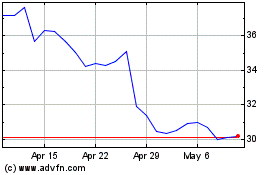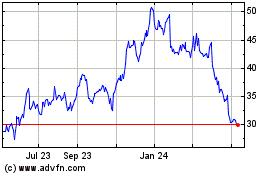By Jay Greene and Vanessa Fuhrmans
Intel Corp. said Chief Executive Brian Krzanich resigned for
violating company policy by having a relationship with a co-worker,
one of the most prominent CEOs to lose a job in an era of greater
scrutiny over workplace behavior.
Intel learned of Mr. Krzanich's relationship in the past week
from an employee who raised concerns, according to people familiar
with the matter. The company said an investigation by internal and
external counsel into what it called "a past consensual
relationship" confirmed a violation of its nonfraternization
policy, which was put into place in 2011 and applies to all
managers.
The company, which said the investigation is continuing,
accepted Mr. Krzanich's resignation Wednesday. Mr. Krzanich, who
was CEO since 2013, couldn't be reached for comment.
Robert Swan, the company's chief financial officer, was named
interim CEO.
Decades ago, board members were more likely to look the other
way on office romances and other personal matters, but the CEO role
today is more high-profile than ever, limiting the room for
transgressions, said executive recruiters and corporate-governance
experts.
The rise of the #MeToo movement has companies hewing closely to
policies on both sexual harassment and consensual relationships,
especially for business leaders, said Davia Temin, chief executive
of Temin & Co., a Manhattan-based reputation and
crisis-management firm.
"There's a new level of rigor that says if something is on the
books, it needs to be upheld and not ignored," she said, adding
that boards are increasingly concerned about a company's
reputation.
Relationship rules at U.S. companies vary. Some companies ban
senior managers from dating anybody further down the chain of
hierarchy within the company, while others ask for co-workers to
disclose their relationships. Many companies have no employee
dating policy at all.
At many major companies, employment contracts for CEOs
explicitly prohibit romantic relationships with employees, or give
boards wide latitude to fire a chief for any behavior considered
unethical, said Jason Hanold, head of executive-search firm Hanold
Associates.
Though such language has been a feature of C-suite contracts for
decades, boards have become more sensitive to improper behavior --
past or present -- in the #MeToo era, he said.
"Today it's a well-known expectation that comes with the CEO
role," Mr. Hanold said. "To have a relationship with anyone in your
organization, you're doing so knowing all of the risks."
Intel prohibits managers from having sexual or romantic
relationships with direct or indirect reports, a spokesman said.
The policy is a "hard ban" that applies to all managers regardless
of seniority and requires employees to raise any concerns
immediately, he said.
Intel held a companywide video call from its Santa Clara office
at 11 a.m. local time, where Andy Bryant, the company's chairman,
and Mr. Swan answered questions, according to an employee who
watched the webcast meeting. During the call, Mr. Swan said he
wasn't interested in staying on as the permanent CEO, the employee
said.
Executives declined to answer employee questions about the
relationship that led to Mr. Krzanich's resignation, saying they
wanted to protect the privacy of the Krzanich family and the person
involved, according to the employee.
"The general feeling is one of disappointment," the employee
said. Intel goes out of its way "to make sure we understand what
the rules are and that we follow them. To have the leader of the
company violate these rules is disappointing."
Intel declined to comment on its internal communications related
to the resignation.
Mr. Krzanich joins other CEOs who left following allegations of
relationships with employees, including Harry Stonecipher, who left
as CEO of Boeing Co. in 2005; Steven Heyer, who left Starwood
Hotels & Resorts Worldwide Inc. in 2007; and Christopher
Kubasik, who was the CEO-in-waiting when he left Lockheed Martin in
2012. Mr. Stonecipher said at the time that he "used poor
judgment." Mr. Heyer denied any impropriety. And Mr. Kubasik said
he regretted his conduct "did not meet the standards to which I
have always held myself."
Mr. Krzanich started at Intel in 1982, rising through a series
of technical and leadership roles to become chief executive in
2013. He set about a broad effort to diversify the company's
offerings beyond processor chips for personal computers, a market
in which Intel holds a more than 90% share, according to Mercury
Research, leaving it scant room to grow as PC shipments
decline.
Mr. Krzanich received $21.5 million in compensation in 2017,
including stock awards and other incentive pay, up 13% from the
previous year, according to a regulatory filing. Intel noted that
Mr. Krzanich would have been eligible for $38 million had he left
the company last year by voluntary termination or retirement. Intel
didn't immediately say whether Mr. Krzanich would receive that
compensation now.
His resignation marked a sudden turn for the tech giant as it
seeks to extend its dominance in personal-computer chips into new
frontiers in computing such as advanced automotive technologies and
artificial intelligence.
It comes at a transformative time for Intel, which under him
swallowed its two biggest acquisitions -- a $16.7 billion deal for
Altera Corp. in 2015 and $15.3 billion for Mobileye NV a year later
-- as it tries to branch out beyond its PC and server-chip
strongholds and fend off rising threats from rivals such
graphics-chip maker Nvidia Corp.
Along with announcing Mr. Krzanich's departure, Intel released a
financial forecast that was above analysts' expectations. For the
current second quarter, Intel expects adjusted earnings of 99 cents
a share and revenue of $16.9 billion. Analysts polled by FactSet
had expected adjusted earnings of 86 cents a share and revenue of
$16.3 billion.
Intel shares finished New York trading down 2.4% at $52.19.
--Yoree Koh, Tripp Mickle and Aisha Al-Muslim contributed to
this article.
Write to Jay Greene at Jay.Greene@wsj.com and Vanessa Fuhrmans
at vanessa.fuhrmans@wsj.com
(END) Dow Jones Newswires
June 21, 2018 19:52 ET (23:52 GMT)
Copyright (c) 2018 Dow Jones & Company, Inc.
Intel (NASDAQ:INTC)
Historical Stock Chart
From Mar 2024 to Apr 2024

Intel (NASDAQ:INTC)
Historical Stock Chart
From Apr 2023 to Apr 2024
